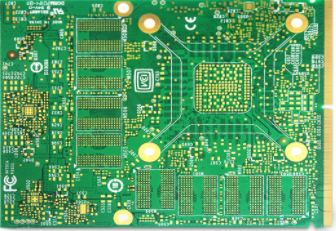Flexible circuit board FBC is a kind of PCB, also known as "soft board". FPC is made of flexible substrates such as polyimide or polyester film. It has the advantages of high wiring density, light weight, thin thickness, flexibility, and high flexibility. It can withstand millions of dynamic bending without damaging the wires., According to the space layout requirements, it can move and expand arbitrarily, realize three-dimensional assembly, and achieve the effect of integration of component assembly and wire connection. It has advantages that other types of circuit boards cannot match.
Multilayer FPC circuit board
Application: Mobile phone
Focus on the light weight and thin thickness of the flexible circuit board. It can effectively save the product volume, easily connect the battery, the microphone, and the buttons into one.
Computer and LCD screen
Using the integrated circuit configuration of the flexible circuit board and the thin thickness. The digital signal is converted into a picture, which is presented through the LCD screen;
CD Walkman
Focus on the three-dimensional assembly characteristics and thin thickness of flexible PCB, turning a huge CD into a good companion to carry;
Disk Drive
Whether it is a hard disk or a floppy disk, it is very dependent on the high flexibility of the FPC and the ultra-thin thickness of 0.1mm to complete fast reading of data, whether it is a PC or NOTEBOOK;
Latest use

Hard disk drive (HDD, hard disk drive) suspension circuit (Suinensi.n cireuit) and xe package board and other components.
Future prospects
Based on the vast FPC market in China, large companies from Japan, the United States, and Taiwanese countries and regions have all set up factories in China. By 2012, flexible PCBs, like rigid PCBs, have achieved great development. However, if a new product follows the rule of "start-development-climax-decline-elimination", FPC is now in the region between climax and decline. Before there is a product that can replace the flexible board, the flexible board must continue to occupy the market share, We must innovate, and only innovation can make it jump out of this vicious circle.
So, in which aspects will FPC continue to innovate in the future? Mainly in four aspects:
1. Thickness. The thickness of FPC must be more flexible and must be thinner;
2. Folding resistance. The ability to bend is an inherent characteristic of FPC. In the future, FPC must be more resistant to folding, which must exceed 10,000 times. Of course, this requires a better substrate;
3. Price. At this stage, the price of FPC is much higher than that of PCB. If the price of FPC comes down, the market will definitely be much broader.
4. Technological level. In order to meet various requirements, the FPC process must be upgraded, and the minimum aperture and minimum line width/line spacing must meet higher requirements. Note that FPC is now in the region between climax and decline. Before there is a product that can replace the flexible board, if the flexible board is to continue to occupy the market share, it must be innovated.